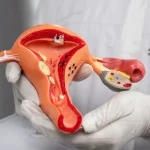
Introduction
One of the most important decisions in IVF is choosing between a fresh embryo transfer (immediately after fertilization) or a frozen embryo transfer (after embryos are cryopreserved and thawed later). Both options have advantages and considerations. This guide will help you understand the differences.
What Is a Fresh Embryo Transfer?
Fresh transfers occur within days of egg retrieval, usually Day 3 or Day 5. The advantage is a shorter treatment timeline, but the body may still be recovering from ovarian stimulation.
What Is a Frozen Embryo Transfer (FET)?
Frozen embryo transfers involve cryopreserving embryos and thawing them for transfer in a later cycle. This allows the woman’s body to recover and the uterus to be optimized for implantation.
Success Rates: Fresh vs. Frozen
Studies show frozen embryo transfers (FET) often achieve equal or higher success rates compared to fresh transfers. Benefits of FET include reduced risk of ovarian hyperstimulation syndrome (OHSS) and better endometrial preparation.
Advantages of Fresh Transfers
– Faster time to pregnancy
– No need for freezing or thawing
– May be beneficial for younger patients with good embryo quality
Advantages of Frozen Transfers
– Higher success rates in many cases
– Safer for women at risk of OHSS
– Flexibility in timing
– Allows for genetic testing (PGT) before transfer
Factors to Consider
1. Age and ovarian reserve
2. Uterine health and endometrial lining
3. Need for genetic testing
4. Medical risks like OHSS
5. Personal preferences and timelines
Patient Story
Anita, 36, initially tried a fresh transfer after egg retrieval but did not conceive. On her second cycle, she opted for a frozen embryo transfer with PGT-tested embryos and successfully conceived twins. She credits the flexibility of FET with her success.
FAQs
Q: Is frozen always better than fresh?
Ans. Not always. Both methods work, but frozen is often safer and more effective in certain cases.
Q: Do frozen embryos lose quality?
Ans. With modern vitrification, embryos maintain excellent survival and implantation rates.
Q: How long can embryos be stored?
Ans. Indefinitely. Healthy births have occurred from embryos frozen for over 20 years.
Conclusion
Both fresh and frozen embryo transfers have a place in fertility treatment. At Surrogacy4All, we help families choose the safest and most effective option for their unique situation.
Learn more at our Guaranteed Embryos Program:
https://www.surrogacy4all.com/guaranteed-embryos/
Contac – info@surrogacy4all.com | Call – 1-212-661-7177

Rashmi Gulati
Rashmi Gulati, MD, provides innovative, individualized health care that nurtures mind, body, and spirit. Since 2004 she has been the medical director at Patients Medical, where she delivers comprehensive personalized health care, treating each patient as a respected, unique individual. Through their integrative health care center in the heart of Manhattan, Dr. Gulati and her colleagues have become premier care providers serving patients locally and throughout the world.





